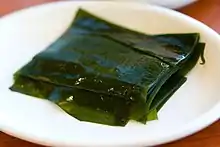kombu
English
WOTD – 15 July 2019

Pieces of kombu
Etymology
From Japanese 昆布 (こんぶ, konbu).[1]
Pronunciation
- (Received Pronunciation, General American) IPA(key): /ˈkɒmbuː/
Audio (RP) (file) - Hyphenation: kom‧bu
Noun
kombu (uncountable)
- Edible kelp (“a type of brown seaweed”) (from the class Phaeophyceae) used in East Asian cuisine.
- 1855, Richard Hildreth, “[Appendix.] Note H. Account of Japan, Chiefly Extracted from Japanese Works. […]”, in Japan as It Was and Is, Boston, Mass.: Phillips, Sampson and Company; New York, N.Y.: J[ames] C[ephas] Derby, OCLC 51360521, page 567:
- [T]he productions of Jeso, in particular, are as follows: konbu, or sea-cabbage, birds of prey for hawking, whales and other sea-fish, skins of otters, beavers, seals, and stags, castoreum, gold, silver, adamantine spar.
- 1874 December 31, Benj[amin] Smith Lyman, “[Letter to General Horace Capron, Commissioner and Adviser to the Kaitakushi]”, in Horace Capron [et al.], Reports and Letters to the Kaitakushi, […], Tokyo: Published by the Kaitakushi [Hokkaidō Development Commission], published 1875, OCLC 248766238, page 424:
- The chief occupation along the shore is gathering the seaweed called kombu (something like our kelp, or quite the same), which is sent in such large quantities to China; and a certain amount of fishing is also done. The kombu grows upon submarine rocks, but for drying it a wide, flat space is needed, and the houses, therefore, are placed along the sandy beaches; and almost every beach however small is occupied.
- 1987 January–February, Margaret Lee Braun, “Warming Up with Winter Soups”, in Stephan Bodian, editor, Yoga Journal, number 72, Berkeley, Calif.: California Yoga Teachers Association, ISSN 0191-0965, OCLC 858131690, page 80, column 1:
- A kombu or kombu-shiitake stock is also quick and mineral rich and makes a fragrant base for broth or miso soup. Wipe a six-inch piece of kombu seaweed with a damp cloth to remove dust and excess salt. Place the kombu in a pot with four to six cups of water. Bring to a light boil and simmer for five minutes. Steep for five minutes. Remove seaweed and use stock. The kombu can be cut and used again in soups or other dishes.
- 1987, Kazutosi Nisizawa; Hiroyuki Noda; Ryo Kikuchi; Tadaharu Watanabe, “The Main Seaweed Foods in Japan”, in Mark A. Ragan and Carolyn J. Bird, editors, Twelfth International Seaweed Symposium: Proceedings of the Twelfth International Seaweed Symposium Held in Sao Paulo, Brazil, July 27 – August 1, 1986 […] (Developments in Hydrobiology; 41), Dordrecht; Boston, Mass.: Dr. W. Junk Publishers, DOI:, →ISBN, section 4 (Laminaria (konbu) and Hizikia (hiziki)), page 12:
- The Japanese tangles are called konbu and represent important genera of seaweeds which have been used as food since ancient times. […] Konbu is harvested mainly in the various coastal areas of Hokkaido during the period from the last ten days of May to the end of September. Konbu is mostly dried in the sun soon after harvest, but sometime[sic] in a hot-air drier depending on weather.
- 2006, Yoshihiro Murata, Kaiseki: The Exquisite Cuisine of Kyoto’s Kikunoi Restaurant, Tokyo: Kodansha International, →ISBN, page 161:
- When it comes to kaiseki, there can be no avoiding a discussion on the subject of dashi, the simple stock based on dried bonito flakes. Almost every dish is built on a foundation of dashi. Although there are many variations, its fundamental ingredients are kombu kelp, dried bonito flakes and water. Kombu contains amino acids such as glutamic acid and aspartic acid and dried bonito flakes contain inosinic acid. In combination these flavor-enhancing acids act to amplify the umami flavor in any dish.
- 2007 February 18, Fuchsia Dunlop, “China’s true dash of flavor”, in The New York Times, New York, N.Y.: The New York Times Company, ISSN 0362-4331, OCLC 971436363, archived from the original on 18 April 2019:
- It [monosodium glutamate] was discovered in 1908 by a Japanese scientist, Kikunae Ikeda, who was trying to pinpoint the source of the intense deliciousness of broth made from kombu seaweed.
-
Alternative forms
- konbu
Hypernyms
- kelp
- tangle
Related terms
- kombucha
- tororokombu
Translations
edible kelp used in East Asian cuisine
|
References
- Compare “kombu, n.”, in OED Online
 , Oxford, Oxfordshire: Oxford University Press, 1933; “kombu”, in Lexico, Dictionary.com; Oxford University Press, 2019–2022.
, Oxford, Oxfordshire: Oxford University Press, 1933; “kombu”, in Lexico, Dictionary.com; Oxford University Press, 2019–2022.
Further reading
 kombu on Wikipedia.Wikipedia
kombu on Wikipedia.Wikipedia
Esperanto
Verb
kombu
- imperative of kombi
French
Noun
kombu m (plural kombus)
- kombu
Japanese
Romanization
kombu
- Rōmaji transcription of こんぶ